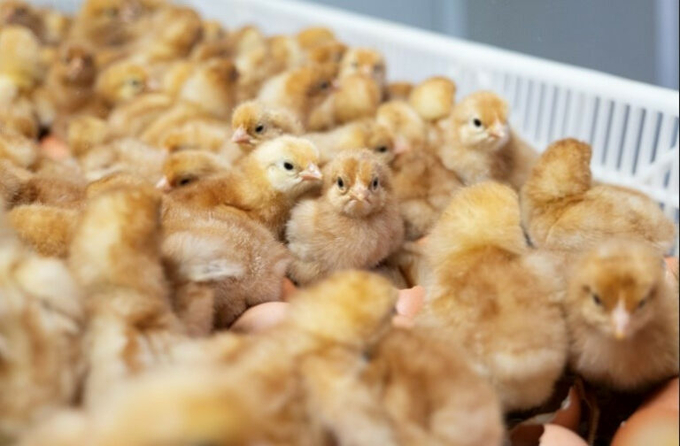May 19, 2025 | 00:01 GMT +7
May 19, 2025 | 00:01 GMT +7
Hotline: 0913.378.918
May 19, 2025 | 00:01 GMT +7
Hotline: 0913.378.918

The first hatched brown layer hens that were in-ovo sexed using Cheggy technology. Photo: Cheggy.
These eggs are all brown and were sexed at hatcheries in Wilton, Iowa and Bryan, Texas, with the chicks delivered to a farm in Texas owned by prominent specialty (brown) egg producer NestFresh. Concerning the egg colour, Cheggy technology, developed by a company called Agri Advanced Technologies (AAT), uses a hyperspectral system that works by analysing the feather colour inside developing eggs and therefore only works for brown layers.
Despite the Cheggy system being relatively cost-effective and fast – it is capable of processing up to 25,000 eggs per hour – It has limited applicability in the US market, where white hens are the vast majority. AAT is the current in-ovo market leader in Europe.
ATT and the other biggest players in-ovo tech firms (Ella by In Ovo, Genus Focus by Orbem, Respeggt by Respeggt Group, and PLANTegg by Hatchtech Group) have all made significant progress in speed, scale and error reduction.
In the US, Indiana-based Happy Egg (which merged recently with Egg Innovations) also announced that it would adopt in-ovo technology by 2025, but has not identified which tech it will use. The company sells 3 billion free-range and pasture-raised eggs a year.
Market acceptance
NestFresh has plans to use Cheggy across all operations. The company will also provide consumers with third-party certification assuring them that these eggs are produced from in-ovo sexed hens.
A survey earlier this year commissioned by Innovate Animal Ag shows that about half of US consumers would be willing to pay an extra US0.05 or more for these eggs. Innovate Animal Ag is a US-based think tank with a core mission to improve animal welfare through advancing cutting-edge technologies.
European progress
In-ovo sexing technology has become widely available in Europe, spurred by bans on the practice of male chick culling in Germany, France and Italy.
In early 2024, six new installations of the technology were announced: Orbem machines at Hendrix hatcheries Bad Bentheim, Pluriton, Lohmann Dorum and Ter Heerdt in Germany and the Netherlands, and Respeggt systems at A.C Weiss and Lohmann Ankum hatcheries in Germany.
In Switzerland, a task force representing poultry industry stakeholders recently announced that the country’s 2 main hatcheries, Animalco and Prodavi, will adopt Orbem’s in-ovo sexing machines in 2025. Orbem will also install a machine during the coming year in a new hatchery at Sirevåg, Norway.
Other technology
Meanwhile, the ovo sexing technology of eggXYT is making inroads in Japan. This system uses genetic editing to attach a fluorescent marker to a sex chromosome in male embryos that is then detected by a scanner.
Amuse, a fully-integrated Japanese egg firm, has just made a large strategic investment in eggXYT.
(Poultryworld)

(VAN) 14 out of 35 domesticated elephants in Dak Lak province have had their living conditions improved, with 11 of them currently participating in the non-riding elephant tourism model.

(VAN) Muong Nhe Nature Reserve hopes that being upgraded to a national park will lay the foundation for forest protection efforts to be carried out in a systematic, modern, and sustainable manner.
/2025/05/16/3923-2-171845_52.jpg)
(VAN) Lower costs, higher yields, and improved soil quality are outstanding benefits that soybeans bring when integrated into the crop rotation system.

(VAN) The 'For a Green National Environment' programme aims to promote a green lifestyle, support businesses in implementing ESG practices, and turn Net Zero commitments into concrete actions.

(VAN) Cold-barn systems efficiently manage environmental and temperature conditions, which aids in the prevention of respiratory diseases in pigs and protects them from the vectors that transmit African swine fevers.

(VAN) To tackle challenges, the project 'Addressing key technical bottlenecks in the grouper supply chain in Vietnam' has been underway since 2024.

(VAN) The project 'Disease-Resilient and Sustainable Cassava Production Systems in the Mekong Region', funded by the Australian Center for International Agricultural Research (ACIAR), is being implemented from 2024 to 2028.